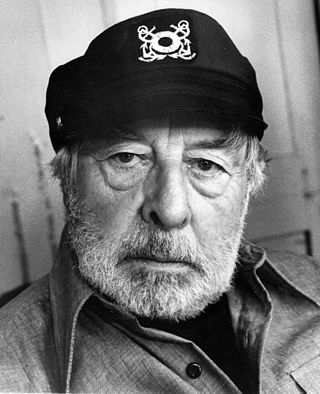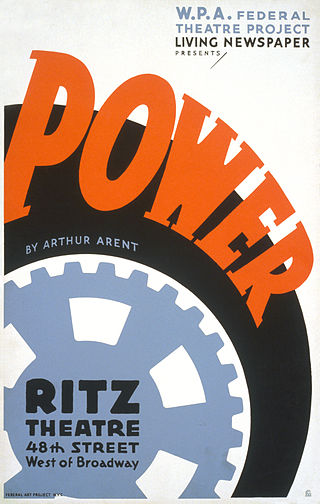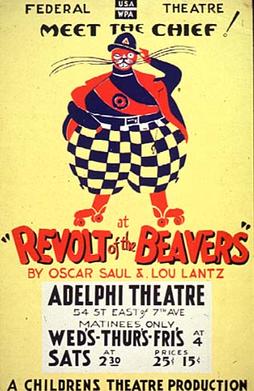
George Orson Welles was an American director, actor, writer, producer, and magician who is remembered for his innovative work in film, radio, and theatre. He is considered to be among the greatest and most influential filmmakers of all time.

Marcus Samuel Blitzstein, was an American composer, lyricist, and librettist. He won national attention in 1937 when his pro-union musical The Cradle Will Rock, directed by Orson Welles, was shut down by the Works Progress Administration. He is known for The Cradle Will Rock and for his off-Broadway translation/adaptation of The Threepenny Opera by Bertolt Brecht and Kurt Weill. His works also include the opera Regina, an adaptation of Lillian Hellman's play The Little Foxes; the Broadway musical Juno, based on Seán O'Casey's play Juno and the Paycock; and No for an Answer. He completed translation/adaptations of Brecht's and Weill's musical play Rise and Fall of the City of Mahagonny and of Brecht's play Mother Courage and Her Children with music by Paul Dessau. Blitzstein also composed music for films, such as Surf and Seaweed (1931) and The Spanish Earth (1937), and he contributed two songs to the original 1960 production of Hellman's play Toys in the Attic.

John Houseman was a Romanian-born British-American actor and producer of theatre, film, and television. He became known for his highly publicized collaboration with director Orson Welles from their days in the Federal Theatre Project through to the production of Citizen Kane and his collaboration, as producer of The Blue Dahlia, with writer Raymond Chandler on the screenplay. He won the Academy Award for Best Supporting Actor for his portrayal of Professor Charles W. Kingsfield in the 1973 film The Paper Chase. He reprised the role of Kingsfield in the 1978 television series adaptation.

The Federal Writers' Project (FWP) was a federal government project in the United States created to provide jobs for out-of-work writers and to develop a history and overview of the United States, by state, cities and other jurisdictions. It was launched in 1935 during the Great Depression. It was part of the Works Progress Administration (WPA), a New Deal program. It was one of a group of New Deal arts programs known collectively as Federal Project Number One or Federal One.

The Federal Theatre Project was a theatre program established during the Great Depression as part of the New Deal to fund live artistic performances and entertainment programs in the United States. It was one of five Federal Project Number One projects sponsored by the Works Progress Administration, created not as a cultural activity but as a relief measure to employ artists, writers, directors, and theater workers. National director Hallie Flanagan shaped the FTP into a federation of regional theaters that created relevant art, encouraged experimentation in new forms and techniques, and made it possible for millions of Americans to see live theatre for the first time. Although The Federal Theatre project consumed only 0.5% of the allocated budget from the WPA and was widely considered a commercial and critical success, the project became a source of heated political contention. Congress responded to the project's racial integration and accusations of Communist infiltration and cancelled its funding effective June 30, 1939. One month before the project's end, drama critic Brooks Atkinson summarized: "Although the Federal Theatre is far from perfect, it has kept an average of ten thousand people employed on work that has helped to lift the dead weight from the lives of millions of Americans. It has been the best friend the theatre as an institution has ever had in this country."

The Mercury Theatre was an independent repertory theatre company founded in New York City in 1937 by Orson Welles and producer John Houseman. The company produced theatrical presentations, radio programs and motion pictures. The Mercury also released promptbooks and phonographic recordings of four Shakespeare works for use in schools.

The Cradle Will Rock is a 1937 play in music by Marc Blitzstein. Originally a part of the Federal Theatre Project, it was directed by Orson Welles and produced by John Houseman. Set in Steeltown, U.S.A., the Brechtian allegory of corruption and corporate greed includes a panoply of social figures. It follows the efforts of Larry Foreman to unionize the town's workers and combat the powerful industrialist Mr. Mister, who controls the town's factory, press, church, and social organization. The piece is almost entirely sung-through, giving it many operatic qualities, although Blitzstein included popular song styles of the time.

Hallie Flanagan Davis was an American theatrical producer and director, playwright, and author, best known as director of the Federal Theatre Project, a part of the Works Progress Administration (WPA).

Living Newspaper is a theatrical form presenting factual information on current events to a popular audience. Historically, Living Newspapers have also urged social action and reacted against naturalistic and realistic theatrical conventions in favor of the more direct, experimental techniques of agitprop theatre, including the extensive use of multimedia. Living Newspapers originated in Russia during the Bolshevik Revolution,

Rose McClendon was a leading African-American Broadway actress of the 1920s. A founder of the Negro People's Theatre, she guided the creation of the Federal Theatre Project's African American theatre units nationwide and briefly co-directed the New York Negro Theater Unit.

Revolt of the Beavers was a children's play put on by the Federal Theater Project by Oscar Saul and Louis Lantz. It was originally directed by Peter Hyun, but he was replaced when his actors refused to go Broadway with him, insisting on a name director. One critic described the play as "Marxism à la Mother Goose". The show ran at the Adelphi Theatre in New York City from May 20, 1937, to June 19 of that year. Jules Dassin and John Randolph were among the play's cast. The play involved a worker beaver named Oakleaf, who leads a revolt against "The Chief" Beaver who was exploiting the workers. Though the play was a fantasy fable intended for children, it was attacked by the HUAC for promoting Communist ideals.

The Voodoo Macbeth is a common nickname for the Federal Theatre Project's 1936 New York production of William Shakespeare's Macbeth. Orson Welles adapted and directed the production, moved the play's setting from Scotland to a fictional Caribbean island, recruited an entirely Black cast, and earned the nickname for his production from the Haitian vodou that fulfilled the role of Scottish witchcraft. A box office sensation, the production is regarded as a landmark theatrical event for several reasons: its innovative interpretation of the play, its success in promoting African-American theatre, and its role in securing the reputation of its 20-year-old director.

The Playhouse Theatre is a theater located at 4045 University Way NE on The Ave in the University District, Seattle, Washington. It was converted from a tile warehouse in 1930 by Burton and Florence James, who set up the Seattle Repertory Playhouse with multi-ethnic performers and audiences.

Can You Hear Their Voices? A Play of Our Time is a 1931 play by Hallie Flanagan and her former student Margaret Ellen Clifford, based on the short story "Can You Make Out Their Voices" by Whittaker Chambers. The play premiered at Vassar College on May 2, 1931, and ran most recently Off Broadway June 3–27, 2010. Broadway World notes that it anticipated John Steinbeck's The Grapes of Wrath and Clifford Odets' Waiting for Lefty, predating them by eight years and by four years respectively.

Horse Eats Hat is a 1936 farce play co-written and directed by Orson Welles and presented under the auspices of the Federal Theatre Project. It was Welles's second WPA production, after his highly successful Voodoo Macbeth. The script, by Edwin Denby and Welles, was an adaptation of the classic French farce The Italian Straw Hat by Eugène Marin Labiche and Marc-Michel.

The 48th Street Theatre was a Broadway theatre at 157 West 48th Street in Manhattan. It was built by longtime Broadway producer William A. Brady and designed by architect William Albert Swasey. The venue was also called the Equity 48th Street Theatre (1922–25) and the Windsor Theatre (1937–43).

This is a comprehensive listing of the theatre work of Orson Welles.
There isn't one person, I suppose, in a million, who knows that I was ever in the theatre.
I've Got the Tune is an American radio opera with words and music by Marc Blitzstein. Dedicated to Orson Welles, it was commissioned by CBS Radio for its experimental series, the Columbia Workshop. Its first performance was broadcast October 24, 1937, with a cast that included the composer, Shirley Booth, Lotte Lenya and Norman Lloyd. The performance was conducted by Bernard Herrmann.
The Comedy Theatre was a Broadway theatre located at 110 West 41st Street in Manhattan that opened in 1909. It presented the first Broadway appearances of Katharine Cornell and Ruth Draper, as well as Eugene O'Neill's first Broadway play. Shuttered in the wake of the Depression, it reopened in 1937 as the Mercury Theatre — the venue for Orson Welles's groundbreaking adaptation of Shakespeare's Julius Caesar and other productions for the Mercury Theatre repertory company. In 1939 it began presenting classic Yiddish theatre. The building was demolished in 1942.

Caesar is the title of Orson Welles's innovative 1937 adaptation of William Shakespeare's Julius Caesar, a modern-dress bare-stage production that evoked comparison to contemporary Fascist Italy and Nazi Germany. Considered Welles's highest achievement in the theatre, it premiered November 11, 1937, as the first production of the Mercury Theatre, an independent repertory theatre company that presented an acclaimed series of productions on Broadway through 1941.


















